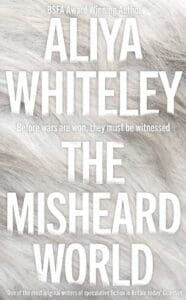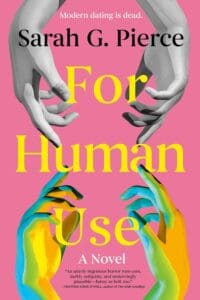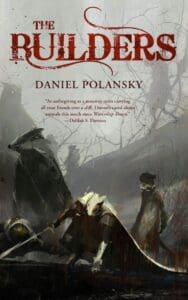FanFiAddicts, we’ve got a special treat today: a guest interview with the fascinating post-apocalyptic author Stephen Patrick, conducted by the awesome Tim Ward.
Tim Ward is both an author and the host of the GotBooks! podcast on YouTube. We’re stoked to have him do this interview for us.
So take it away, Tim!
“Hello, FanFiAddicts! Thanks for hosting me.
I read and loved The Holocaust Engine (you can see my review here) so I was excited to talk with Stephen Patrick, one of the authors of The Holocaust Engine.

The Holocaust Engine is a unique Post Apocalyptic adventure set in the Florida Keys. I really enjoyed the twist on Quarantine Thrillers by showing how an outbreak would unfold in paradise on Earth. Instead of showing patient zero get out of a jungle to spread it over a continent, our heroes had to watch the government shut them in a small section of Florida with monsters far more threatening than simple minded zombies.
Synopsis:
It begins with disease.
A brain-rotting virus, which leaves its victims disoriented and hyper-violent, rages out of Cuba into the Florida Keys. The bewildered government destroys the mainland bridge and places the islands under quarantine. Inside this cordon, the population descends into chaos, as rival factions battle over dwindling resources, buildings become fortresses, boats lash together as defensible islands, and whole neighborhoods wall off into armed camps.
As order slips beyond any chance of recovery, hopelessness reigns. But not everyone accepts this fate.
Book 1 is currently 99 cents, so this is a great time to start The Holocaust Engine.
Tim: Why set this monster romp in the Florida Keys?
Stephen: The original kernel of an idea surrounded a quarantine that spirals out of control when the people involved focus on themselves, not the problem. Their worldview leaves them unable to reason through the problem without making themselves the main characters in their own imagination, turning a catastrophe into an apocalyptic crisis.
We wanted a setting that was special and Key West gave us everything we wanted. With a total area of only four miles at the southernmost point of the United States, Key West is mostly known for a laid-back attitude, a rebellious streak, and more than its share of interesting landmarks for such a small space. In addition to beachfronts and tourist hangouts, there’s a ‘haunted’ cemetery, a nun’s abbey, and a military installation with everything from a Navy SEAL training center to a submarine pen. The rebellious streak manifested as a secession movement in the 1980s, as The Conch Republic (which returns in our book). For many people, Key West is considered a paradise on Earth, so we thought it made a great place to turn into hell on Earth.
From a logistical standpoint, we were drawn to dropping a quarantine in Key West because the island has limited natural resources. This means the traditional prepper toolkit comes up short, forcing folks into different strategies to survive. However, the U.S Government steps in with regular deliveries of food, water, and other materials, leading to a “sustainable disaster”. With stable supply chains, how does that change the survival calculations for the folks trapped inside? This allowed us to explore a unique, sustainable disaster and what it would do to the folks left inside.
A competing challenge comes from the natural obstacles that limit the effectiveness of a simple military cordon. The Florida Keys form a land bridge and many islands have shallow water on at least two sides, meaning that someone could try and escape by land, sea, or even by using the shallow water to avoid aerial detection or use narrow mangrove channels to avoid detection from watercraft on all sides. Despite the dangers of the infected leaving the island, you can’t simply wall them in or wrap a fence around the island. And that’s only the beginning of Book One.
Tim: Why the POV and varying forms of narration?
Stephen: To explore the impact of worldview and narcissism, we built around four main characters, each with different worldviews. This gave us a lot of freedom to explore each character’s approach to life, their blind spots, and the limitations they can bring, which mirrors those worldviews currently impacting our modern society.
Although we write together, we have very different writing styles and voices. It was a natural extension to use those differences to present specific characters, scenes, and arcs in the series. We also wanted people to experience the events at multiple levels, including desperate on-the-ground events, side gritty military operations, intense thousand-mile-high views and planning, and even high-stakes political intrigue. For two characters, first-person audio recordings give readers the closest look, and were the best way to really understand the characters.
This process builds into a fast, dynamic story that continues with Fluid Shock, the second book in the series. We continue to use different POVs, as Fluid Shock begins with an omniscient narrator asking what the absolute limits of human endurance might be, before we take the reader back into the quarantine zone as it descends into chaos. There we meet a pair of new characters, a military contractor sent inside the quarantine zone, and a police detective who had been in hiding since early in the events of Book One. These characters give the readers a fresh (sometimes unflattering) view of the characters from The Holocaust Engine, and unveil a lot of secrets along the way. Book Three, Unda Sanguis, continues this theme as we pull out all the stops when the survivors discover their ultimate threat, and try desperately to escape while a category 3 hurricane barrels down on the islands. Everything comes together and we return to a third-person narrative to compare the ways of looking at the world that are self-defeating against those that allow a person to do things that might seem nearly impossible and invite the reader to challenge their own beliefs.
Tim: What was your background leading to your writing partnership and decision to write this type of book?
Stephen: We’ve worked together for over 20 years, in various capacities in local public service, including leading teams through disasters and seeing how cities and people confront challenges. Despite different writing styles, (David is a “plotter” and Stephen is a “pantser”) we really enjoy exploring the strengths of both approaches to uncover whatever story that we have been given to tell. With that, we regularly challenge each other, resulting in tough conversations, lunchtime spats, and more than a few “eureka” moments when we are reminded that it takes heat and pressure to turn coal into diamond.
Tim: In my review I note a couple areas I enjoyed from the unique setting to how you mix a cool killer with a taxi driver and a detective, with a couple purely told by audio recording. I know nothing about either of you and how you became writing partners and what you love about horror that made you want to write this series.
Stephen: We both love horror and science fiction and really wanted to tell a story that fit our personal tastes and experiences and tell it in a way that would push us and the reader to some new areas of story-telling. The result is the many layers that exist in the series, including a few twists, and turns, and characters and scenes that are sometimes emerge fully formed from our imagination and other times came straight from the real world.
Regarding the characters, some, like Reagan, Hunter Grant, and Capt. Nelson were just pitch-perfect for their scenes and the story we wanted to tell. Some, like Max-a-millions, our taxi driver, were even more real (I sat next to the inspiration for Max on a 3-hour flight to Orlando) and just forced their way into the story. Our characters are definitely not friends and not all are likable, but they were our perfect guides into The Holocaust Engine.
Stephen’s been writing horror for as long as he remembers and relishes the chance to instill fear in a reader or viewer. As a lover of horror, his favorite stories mix physical danger with psychological terror and explore emotions and behaviors that make us human. He relishes a good story that makes you pause before turning the page, your heart racing, not sure if you really want to go down the stairs, or open the hatch, or slip into the water. Even more, he hopes his stories give you no choice but to face those fears. His work has been featured in a dozen anthologies and he’s won numerous short story awards for his horror fiction.
David styles himself as a scholar of all genre fiction, and horror is one of his favorites. Unfortunately, it’s his belief that our world is unraveling and that, increasingly, our collective future is looking like it may be something horrifying. Fiction gives us all a chance to think through the various possibilities and implications and The Holocaust Engine serves as a ‘playground of the mind’ (well, more like a haunted house) for those ideas.




Thanks to Tim Ward, David Rike and FanFiAddict for this interview and the opportunity to talk about our series, our love of stories and our process.
Thanks for hosting our chat! I love that Max was inspired by a 3 hr flight neighbor. He has a lot of character.